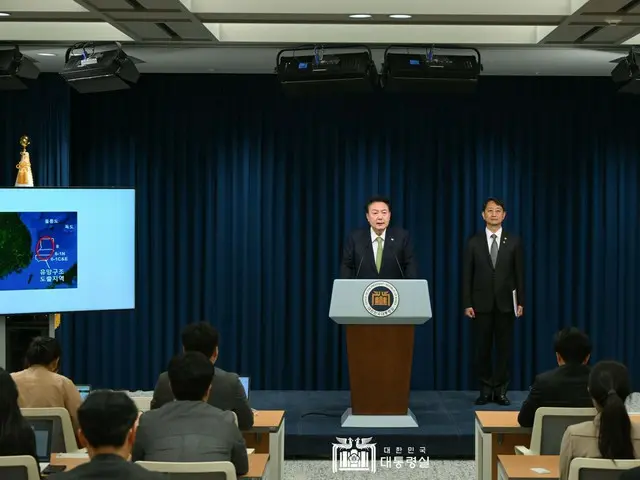President Yoon has also expressed his desire to pursue commercial development, but the South Korean government has put the success rate of the drilling at around 20%, and the South Korean newspaper Hankyoreh has reported that "the possibility of the existence (of oil and gas) is
Experts say it is difficult to paint a rosy future based on the concept of "sexuality alone." President Yoon said at a press conference on the 3rd, "In February last year, many people were killed in a gas field in the Donghae area.
"We have decided that there is a high possibility that oil and gas fields exist, and have asked a world-class deep sea technology assessment specialist company to carry out a deep geophysical survey," he said. "The largest area (off the coast of Yeongil Bay in Pohang City)
"It is highly likely that there are 14 billion barrels of oil and gas reserves in the area," he said. The deep geophysical survey analysis that President Yoon spoke about was carried out by Acton, a US energy exploration company.
Geo. Vitor Avreu, CEO of Geo., visited Korea recently and held a press conference on the 7th. Avreu said, "This project is very promising because all the oil wells we have analyzed have no traces of petroleum.
"It has all the elements that suggest the presence of oil and gas," he said. "Given its potential, it has already attracted the attention of international oil companies."
South Korea, like Japan, is a country with few natural resources, and has been exploring for offshore oil and gas fields since the 1960s. Following the first oil crisis in 1973, then-Park Chung-hee
The Hee-hee administration began drilling the seabed off the coast of Yeongil Bay in Pohang City to meet its own oil supply and demand. In 1976, President Park announced that "oil has been discovered off the coast of Pohang for the first time," sparking great joy.
However, the government finally announced the following year that drilling had been halted because it had become clear that the project was not economically viable. In the late 1990s, a 45 million barrel gas field was discovered in the Sea of Japan, but
Commercial production ended in 2021. President Yoon announced at a press conference on the 3rd that the amount of oil and natural gas likely to be found in the Sea of Japan off the coast of Pohang is estimated to be up to 14 billion barrels.
The amount of the drilling will cover South Korea's natural gas consumption for up to 29 years and its oil consumption for up to four years. According to President Yoon, drilling surveys will begin at the end of this year, and detailed results will be available in the first half of next year.
President Yoon also mentioned the possibility of commercial development starting around 2035, but an official from the Ministry of Trade, Industry and Energy said the success rate of the drilling is around 20%.
Some Korean media outlets have reported that the total value of the resources lying beneath the ocean floor is five times the market capitalization of Samsung Electronics, but some have questioned whether the development of oil and gas off the southeast coast of Korea is a hasty move.
The report was generally calm, with comments such as, "It is too early to assess the economic viability" (Hankyoreh) and "The Korean News Agency" (Kangyoreh). The Yonhap News Agency reported that the mining area that was announced this time as having a high possibility of having large-scale oil and gas reserves was located in the area where the mine was discovered last year.
In 2017, the Australian resource giant Woodside Energy withdrew from a joint exploration project, citing "no future prospects." The Hankyoreh also reported this, saying, "Woodside's 2023
The 2019 annual report states that the company will withdraw from Korea, the waters off Canada, Peru, Myanmar, and other areas because "there is no longer any future prospect for the area."
In response to these reports, the South Korean Ministry of Trade, Industry and Energy said Woodside was withdrawing from the business as it was reorganizing its existing operations after merging with Australia's major resource company BHP in June 2022.
"The interpretation that the government concluded that there was no future potential based on a deep-depth evaluation is contrary to the facts," the opposition party said.
The Democratic Party of Korea has criticized the plan, saying, "It is highly likely to fail and will be a waste of tax money." In an editorial published on the 9th, Hankyoreh said, "South Korea, which is dependent on foreign countries for about 95% of its energy resources,
"It would be really great if we could succeed in developing large-scale energy resources within the country," he said, adding, "At least 500 billion won (US$530 million) will be spent on drilling surveys."
"It is necessary, and in some cases we may lose the entire amount," he said, arguing that "it is only natural that the Diet, which has the power to approve the budget, should conduct a thorough review."
2024/06/12 13:17 KST
Copyrights(C)wowkorea.jp 5

